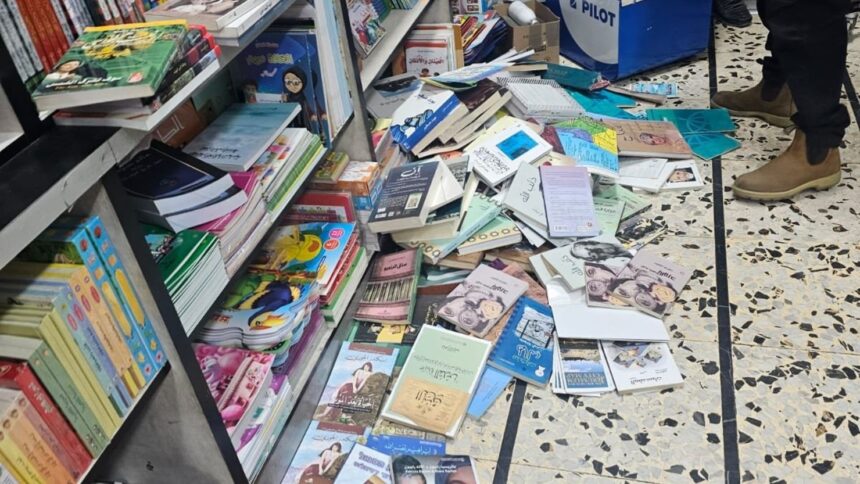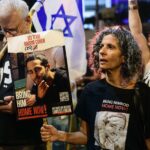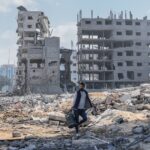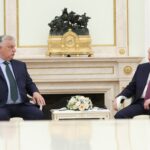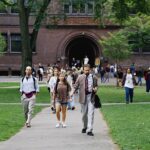Mahmoud Muna looked on in disbelief as plain-clothes Israeli police officers rifled the shelves in his decades-old bookstore in occupied East Jerusalem.
The officers were looking for books they deemed “inciteful,” and in the process detained him and his nephew, Ahmad, for 48 hours.
The February raid on two branches of the Educational Bookshop – a well-known bookstore popular among Palestinians, Israelis and foreigners – was a widening of what critics describe as a crackdown on free speech in Israel that has intensified since Hamas’ October 7 attack.
Witnesses to the raid said police were looking for any book containing the word “Palestine,” a Palestinian flag, its colors, or any symbol of Palestinian national or political identity.
Israel’s police said at the time that they conducted the raid because the stores were “suspected of selling books containing incitement and support for terrorism.” On Tuesday, they raided the shop again, detaining Mahmoud’s father, and the shop’s co-owner, Imad.
“You could be… running one of the most international bookshops of the city, and within the 30 minutes, you are in a dungeon underground in a detention center, and everyone is shoving and kicking you, and you have very little rights whatsoever,” Muna, a Palestinian from Jerusalem, told CNN before the second raid from his home, where he was under house arrest at the time.
Muna spent two days in custody and was under house arrest for five days, after which he was not allowed to be in his bookshop for another two weeks. The charges against him were downgraded from incitement to “disrupting public order,” he says.
During Tuesday’s raid, Ahmad Muna said police confiscated books by Noam Chomsky, as well as historians Ilan Pappé and Rashid Khalidi.
The raids have alarmed not only Israeli activists but also Israelis in general. Critics warn it sets a dangerous precedent in a country whose prime minister calls it the “only democracy in the Middle East.” They argue that voices critical of Israel’s war in Gaza – and the staggering death toll it has caused – are increasingly being silenced through intimidation and legal action.
“What happened in the bookstore… should be a red light, a very strong red light for all of us,” said Gideon Levy, a veteran Israeli journalist who was once a prominent voice in Israel’s left but has become increasingly marginalized in the national discourse. He is often seen on international news channels but now says he is no longer invited to give interviews on Israeli television.
“In Israel, there is a government which is using anti-democratic means, not to say fascist means, against freedom of thought, freedom of speech, any kind of freedom. And they do it with pride,” he told CNN.
David Mencer, a spokesman at the Israeli Prime Minister’s Office, has said that “any measures which are taken are always taken within the framework of Israeli law, with all the appropriate checks and balances from our democracy.”
“We will maintain freedom of speech under the rule of law,” Mencer said in a press briefing in response to CNN’s question.
‘Systematic political persecution’
Critics however say Israeli authorities’ attempt to police speech have expanded in scope since October 7.
Leftist politician Ofer Cassif is the only Jewish lawmaker in the Arab-majority Hadash-Ta’al party in the Knesset, Israel’s parliament. Lawmakers tried but failed to expel him from parliament last year after he signed a petition of support for South Africa’s genocide case against Israel for its war in Gaza, which has killed more than 48,000 people, according to the health ministry there. Israel vehemently denies charges of genocide. In November, the parliamentary ethics committee suspended Cassif from the Knesset for six months, allowing him to enter the chamber only to cast votes.
“There is an ongoing, profound, systematic political persecution of anyone who raises an alternative voice to the government, of anyone who raises a voice,” he said. “And the stronger it is, the stronger is the persecution.”
Still, Cassif maintains that there are “thousands and thousands” of “democratic Jews like myself” in the country, but says they are being increasingly marginalized.
Levy’s newspaper, Haaretz, has also been targeted. In November, the Israeli cabinet unanimously voted to ban the government from interacting with the paper, citing its critical coverage of the war in Gaza and comments by its publisher calling for sanctions on senior government officials.



